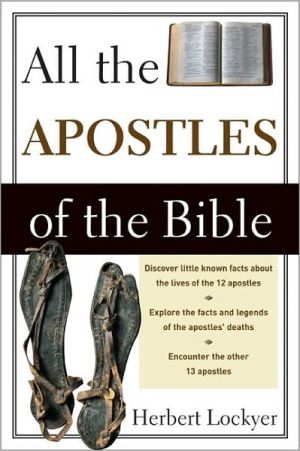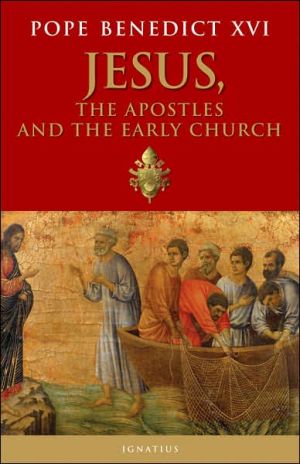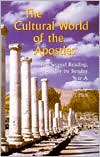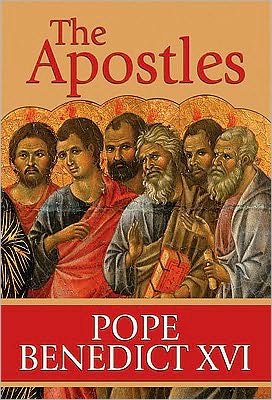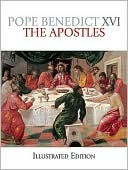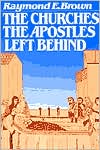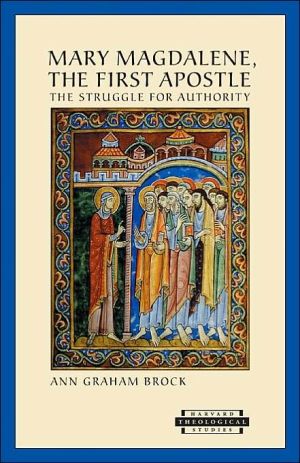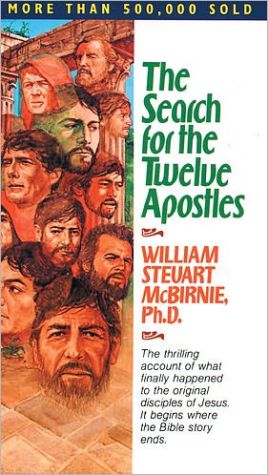All the Apostles of the Bible
Powerful Lessons from the Men Jesus Chose and the Message They Proclaimed\ All the Apostles of the Bible sheds light on the lives, times, and ministries of the men God chose to declare his message to the world. It includes the twelve apostles of Jesus, Jesus himself as the 'Chief Apostle,' Paul, and lesser-known men such as James the Lord's brother, Matthias, Andronicus, Barnabas, Epaphroditus, Silas, Timothy, Junias, and Apollos. Dr. Herbert Lockyer examines the biblical record to uncover...
Search in google:
These studies on the character of the Apostles form a complete series on the lives, times, and ministries of those men chosen by God to declare his message to the world.
All the Apostles of the Bible\ \ By Herbert Lockyer \ Zondervan\ Copyright © 1998 Zondervan\ All right reserved.\ ISBN: 0-310-28011-7 \ \ \ Chapter One\ The Prayerful, Purposeful, and Particular Choice of the Twelve \ Jesus is calling in accents of tenderness,\ Jesus is calling, my brother, to thee, Just as of old, by the waters of Galilee,\ Fell from His lips the command, Follow Me!\ Approaching the fact and features of our Lord's choice of the twelve apostles, an evident truth that must be emphasized is that He called them to follow Him, not because of what they were in themselves when He met them for the first time, but because of what, under His tuition, and by His power they would become. Like Michelangelo, the famous sculptor, Jesus saw the angel in the rough, uncut marble. Such a vision and decision is found in His declaration to Peter, "Thou art Simon the son of Jona: thou shalt be called Cephas ... A stone" (John 1:42).\ To the outward eye it seemed as if the Divine Potter had chosen very common clay indeed out of which to fashion His witnesses and mighty workmen. If there was anything extraordinary about them, it was visible to His omniscient eyes for He alone "knew what was in man." And so, "because he knew all men" (John 2: 24,25), He chose peasants from the village, provincial townsmen, and toilers of the sea as His first disciples. While most of them earned their livelihood by ordinary handicrafts, and were evidently respectable men from the moral point of view, with a religious bent in their character, there was nothing about them to give one the slightest indication of exceptional qualities or fitness for the remarkable service they were to render. But the whole world came to know what the example and equipment of Christ made them - twelve of the strongest, noblest, and most fearless and serviceable men (except for Judas Iscariot) who have appeared in human history. The transformation of the twelve was not the least, it was almost the greatest of Christ's miracles.\ The Master, then, chose twelve obscure men to be His apostles for His mind was not upon their immediate ministry, but upon the mighty things they were to accomplish after His ascension to heaven. They were to certify the facts of their Lord's life, death, and resurrection (see Luke 1:1-24; John 15:27; Acts 1:1-3; II Pet. 1:16; I John 1:1-3). As there are no facts of history more irrefutable than those relating to Christ, and the establishment and expansion of His Church, it was necessary to have eye-witnesses whose testimony would be overwhelmingly convincing. To them had been granted "many infallible proofs" of their Leader's resurrection from the dead, and it was for the purpose of certainty and certitude of such a dynamic Gospel that He chose the twelve, and prepared them in every way for their gigantic task (Luke 24:48, 49; Acts 1:8; 2:1-5, 32, 33).\ The application for our hearts in all this is that it is not what we are, in ourselves, when we hear and respond to Christ's call, but what by His grace and power He can make us as we company with Him. When Jesus called those first disciples, He said, "Follow me, and I will make you" - and there are no self-made Christians in His service; they are all Christ-made. Self-made men are usually not made up of good material, and they can be wrapped up in a very small parcel. But those whom the Lord wants and wins, are those He is able to fashion into human books to tell the story of His love and grace. As did those He gathered around Him in the days of His flesh, disciples today begin their apprenticeship by following Christ, daily learning of, and from, Him (Matt. 11:29). Then, as they grow in grace and knowledge, they become more fitted to represent the Savior in a world of sin and need.\ There are several aspects, noteworthy and profitable to ponder, arresting our attention in respect to the Lord's choice and appointment of the twelve. Notice that their first meetings in life contained the elements of future destiny. The decision made at such points of experience colored and controlled the course of after-years. They are the mysterious birth-times in personal history, and often in world history. It was thus with those who rose up and followed Christ.\ 1. The Choice Was o f His Sovereign Will and Plan\ We read that Christ "calleth unto him whom he would" (Mark 3:13). Those called were not consulted beforehand, nor did He seek anyone's advice upon the qualifications of those He was to call. The choice was of His own sovereign will and purpose. As He foresaw the whole path stretched before Him, so He instinctively knew the kind of men He needed as trustworthy witnesses of the entire sacred drama of His life, death, resurrection, and ascension. It is this distinctive feature that makes the story of the twelve so memorable. Their appointment was carefully foreordained, deliberate, and momentous and far-reaching in results. In connection with our Lord's foreknowledge, the problem of the inclusion of Judas Iscariot in the apostolate is fully dealt with in our cameo about the betrayer.\ 2. The Choice Was Made After a Night of Prayer\ It is Luke who informs us that "[Jesus] went out into a mountain to pray, and continued all night in prayer to God. And when it was day, he called unto him his disciples: and of them he chose twelve, whom also he named apostles" (Luke 6:12, 13).\ The number of the disciples from whom a selection of the twelve was ultimately made, we are not told, nor are we given any hint of the method of choice. We do know that for some eighteen months Jesus made, taught, and watched those who followed Him, as only He could, with that perfect intuition of His. Faced with the necessity of laborers to help Him gather in the harvest, few prayers left His holy lips more frequently or fervently than the one for heaven's guidance in regard to the selection of the apostles from among His disciples. Thereafter, His intercession focused on the twelve whom He chose, that they might be separated from the world and unto Him, and bring forth fruit (John 15:16-19).\ Even in His great intercessory prayer in the upper room, when the treachery of Judas was unmasked, Christ's conviction was unwavering and unruffled. Listen to His tone of assurance, "Thine they were, and thou gavest them me.... none of them is lost, but the son of perdition; that the scripture might be fulfilled" (John 17:6, 12).\ In the light of this assertion, it is clearly seen that the defection of Judas-so far from showing an error of judgment on Christ's part in His choice of Judas-is but the unfolding of events which were comprehended in the divine will, and the endorsement of an age-long prophecy (Zech. 11:12, 13). The most remarkable prayer ever prayed in the upper room was but an echo of that night with God spent on the mountain, before Christ's choice of the twelve was made. Can we say that all our decisions in life are preceded by intense and prolonged prayer for guidance?\ 3. The Choice Was Limited to Twelve\ Why did Jesus select exactly twelve, no more, no less? This was a considerable retinue for a teacher to have. Three men would have been a respectable following; six men would attract notice; twelve men are remarkable. Every village must have turned out to see what it meant to band twelve young men of character and purpose under one head. Dr. J. Elder Cumming suggests that the selection of twelve was extraordinary because, for a time, there seemed to be nothing for them to do.\ Now they have no occupation. They have given up the pursuits in which they were engaged: their fishing, their tax-gathering, their agriculture. They carry on no business. They simply walk on around and behind their leader, talking to each other, or to Him; and when He speaks to the people who begin to gather, they listen just like others. The only thing they do is to go with Him from place to place. They are idle! And it begins to be a question whether it is not doing harm, and giving rise to reproach, that twelve men are being kept idle for no apparent purpose, and neglecting obvious duties in order to be so. This was at the beginning of the movement, after the disciples had been chosen.\ For a time they were disciples, or "learners," and they had to learn before they could teach; hence their observation of Christ as they began to follow Him. But what is the significance behind the exact number chosen, as well as behind the men Christ chose? Twelve is the number suggesting governmental perfection, so it was no accident that He selected such a number. Dr. Samuel Chadwick says that the fact that "Jesus appointed twelve is clear illustration to the tribes of a new people, another peculiar people." He came as the Messsiah and was cut off that He might bring a spiritual nation into being (Isa. 11:6-10). Before Him, no other rabbi had dared to assert such a claim.\ (Continues...)\ \ \ \ \ Excerpted from All the Apostles of the Bible by Herbert Lockyer Copyright © 1998 by Zondervan. Excerpted by permission.\ All rights reserved. No part of this excerpt may be reproduced or reprinted without permission in writing from the publisher.\ Excerpts are provided by Dial-A-Book Inc. solely for the personal use of visitors to this web site. \ \
Contents Introduction I. The Prayerful, Purposeful, and Particular Choice of the Twelve II. The Privileged Preparation of the Twelve III. The Particular Personalities of All Named Apostles I. The Original Apostles -- The Twelve Andrew -- The Apostle Who Shared Christ Personally Bartholomew -- The Apostle Conspicuous for his Transparency James, the Son of Alphaeus -- The Apostle Who Rendered Obscure Service James, the Son of Zebedee -- The Apostle Who Became Known as Great John -- The Apostle Who Personified Love Judas Iscariot -- The Apostle Who Committed Suicide Matthew -- The Apostle Who Wrote a Great Gospel Peter -- The Apostle Who Was Hot-hearted Philip -- The Apostle Who Was Slow-witted Simon the Canaanite -- The Apostle Who Was a Revolutionist Thaddaeus -- The Apostle Who Had Three Names Thomas -- The Apostle Most Maligned II. The Other Apostles -- The Wider Circle Andronicus -- The Apostle of Note Apollos -- The Apostle Who Was Eloquent Barnabas -- The Apostle of Comfort Epaphroditus -- The Apostle Who Risked His All James, the Lord's Brother -- The Apostle Who Preached Practical Morality Junias, or Junia -- The Apostle Whom Paul Praised Matthias -- The Apostle Chosen by Lot Paul -- The Apostle Extraordinary Silas -- The Apostle Who Was an Understudy Two Unnamed Apostles The Lord Jesus Christ -- The Apostle of Apostles IV. The Legendary Deeds and Deaths of the Apostles Andrew Barnabas Bartholomew James, Son of Alphaeus James, Son of Zebedee James, the Lord's Brother John Judas Iscariot Matthew Matthias Paul Peter Philip Simon the Zealot Thaddaeus Thomas Appendixes Bibliography Scripture Index
